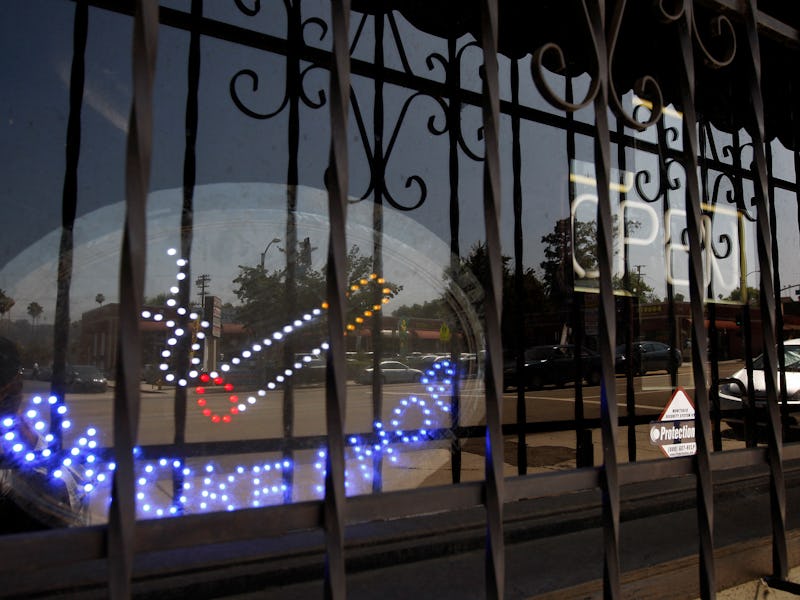Pot Dispensaries Fight Crime, New Study Reveals
Why every neighborhood should welcome stoner business.

If you’re against marijuana dispensaries setting up shop on your block, you’re rooting for higher crime rates.
That’s the surprising conclusion of new research, published this month in the Journal of Urban Economics. The researchers found that Los Angeles neighborhoods saw a spike in crime in places where the city forced pot shops to shutter.
“Contrary to popular wisdom, we find an immediate increase in crime around dispensaries ordered to close relative to those allowed to remain open,” write coauthors Tom Chang at the University of Southern California and Mireille Jacobson at the University of California, Irvine.
Many Americans, it seems, have a NIMBY attitude to weed. Surveys have revealed that while 90 percent support the availability of medical marijuana, nearly have don’t want it sold close to where they live, the article notes. Presumably, people worry that dispensaries will attract the wrong sort of people doing the wrong sort of business. Or, maybe, that junkies in the area would turn to theft in order to pay for their habit.
A sign advertises an LA clinic offering medical marijuana evaluations and prescriptions.
That was part of the reasoning of the City of Los Angeles when it decided to cap the number of marijuana dispensaries allowed to operate in 2010. While in retrospect this decision was based on a false premise, it did provide the researchers an opportunity for a controlled experiment in the real world. They compared crime rates in the immediate vicinity of 180 dispensaries allowed to remain open and 417 forced to close.
It turns out that crime went up near the shuttered pot shops immediately, especially the sorts of crime that might reasonably be deterred by having more people on the streets, like vehicle break-ins.
The researchers noticed a similar pattern when they looked at data from temporary restaurant closures, suggesting that it’s not specifically dispensaries that reduce local crime, but any sort of shop that’s going to increase foot traffic through the area.
So, if a marijuana dispensary wants to come to your neighborhood, its potential impact on crime depends on context. If the business is replacing an existing shop that generates a comparable amount of people walking by, likely there will be little effect. But if the pot shop is filling a vacancy, the potential to reduce neighborhood crime is significant, particularly if it’s within walking distance of residential areas. (The researchers found less of an effect in car-dependent neighborhoods, where people would normally need to drive to the shops.)
It’s fortunate that Los Angeles’s bad decision led to such solid evidence to inform future policy, if only the politicians could stop wailing about the safety of the children for long enough to listen.
Abstract: Jurisdictions that sanction medical or, more recently, recreational marijuana use often allow retail sales at dispensaries. Dispensaries are controversial as many believe they contribute to local crime. To assess this claim, we analyze the short-term mass closing of hundreds of medical marijuana dispensaries in Los Angeles. Contrary to popular wisdom, we find an immediate increase in crime around dispensaries ordered to close relative to those allowed to remain open. The increase is specific to the type of crime most plausibly deterred by bystanders, and is correlated with neighborhood walkability. We find a similar pattern of results for temporary restaurant closures due to health code violations. A likely common mechanism is that “eyes upon the street” deter some types of crime.